home | internet service | web design | business directory | bulletin board | advertise | events calendar | contact | weather | cams

|
Incredible Impact Liberty Bell High School ranks first academically among high schools in Eastern Washington, according to the latest U.S. News and World Report ranking. 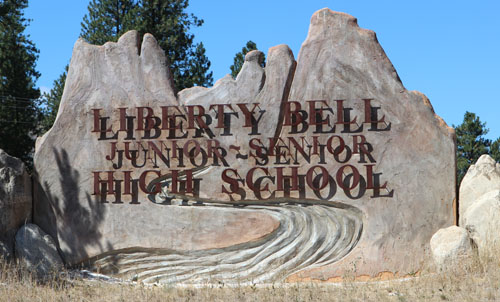 The entrance sign to the Methow Valley’s public high schools located between Winthrop and Twisp on the Twin Lakes road. Photo by Solveig Torvik The entrance sign to the Methow Valley’s public high schools located between Winthrop and Twisp on the Twin Lakes road. Photo by Solveig TorvikAnd Liberty Bell is in 12th place in Washington, according to the magazine, which annually surveys how well the nation’s students perform on state reading and math tests and how well they’re prepared for college. Students and educators certainly deserve applause for that fine showing, says Liberty Bell High School English teacher Adam Kaufman. But he says credit also is due to members of the community who’ve contributed funds that have helped make such accomplishment possible at a time of cutbacks in education funding. He’s talking about the Public School Funding Alliance, and he’s not talking peanuts. Over the past 10 years, the organization has funneled more than half a million dollars donated by the local community to the school district for enrichment programs, according to executive director Ann McCreary. Last school year, it was $94,076, donated by 237 individuals and businesses. Kaufman’s experience with the PSFA began when he decided he wanted to teach Advanced Placement English, a college level course, which would become the first AP course offered at the school. For more than 50 years, students who pass the College Board’s year-end AP exams have been granted college credit for the course by colleges and universities. “I wanted to start the AP program because I thought it would be meaningful and challenging to the students,” he told Grist, but he needed financial help to attend the AP teacher training program. He applied to the PSFA and got the $700 he needed. PSFA since has paid for books for his AP classroom. 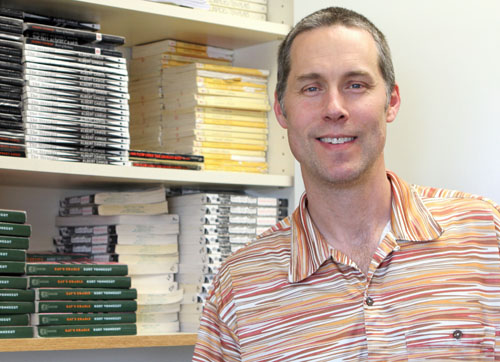 Liberty Bell High School English teacher Adam Kaufman started Advanced Placement English classes with the help of the PFSA. Photo by Solveig Torvik Liberty Bell High School English teacher Adam Kaufman started Advanced Placement English classes with the help of the PFSA. Photo by Solveig TorvikWhether high schools offer AP courses—and how well their students perform on the AP tests—are among criteria used by U.S. News and World Report in its academic rankings. Liberty Bell now offers 11th and 12th grade AP English, AP history, and an AP current events class. AP calculus will be added in the near future, according to district superintendent Mark Wenzel. The PSFA has “played a big role in raising academic rigor by encouraging and supporting Advanced Placement teacher training,” says McCreary. “I personally think this is one of the most significant impacts that PSFA has had in enhancing education at the high school,” she adds. Secretary of the all-volunteer PSFA when it was founded, she was hired as executive director in 2011. Kaufman, a Yale graduate with a degree in English who holds a master’s degree from Western Washington University in Bellingham, grew up in Concord, Mass., a stone’s throw from Thoreau’s famed Walden Pond. This spring he’s finishing requirements to become the fourth teacher in the district to be granted National Board certification. “I don’t think this is a very common thing,” says Kaufman of the amount of community support for enrichment programs. Thanks to PSFA donors, “I think we have unusually robust programs for a rural school district,” he adds. 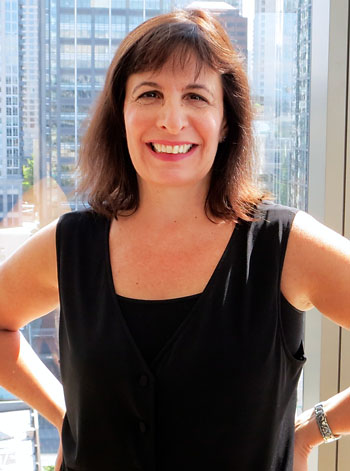 Jana Mohr Lone founded the Public School Funding Alliance. Photo courtesy Jana Mohr Lone Jana Mohr Lone founded the Public School Funding Alliance. Photo courtesy Jana Mohr LoneJana Mohr Lone agrees. She founded the organization in 2003 with 14 other people who shared her concern that enrichment programs such as music and the arts were being lost in budget cuts. Recently arrived in the valley from Vashon Island, she had been impressed by a group there called Partners in Education, which raised funds for school enrichment programs. She thought something similar should be established here. “I could see that there was an enormous commitment to education by community members,” says Lone. Trained as an attorney, for the past 17 years she has been executive director of the Northwest Center for Philosophy for Children, an affiliate of the University of Washington’s philosophy department. Her impression of the community’s concerns about education was borne out by the response to the first year’s fund raising. The PSFA set a goal of $10,000. “We raised $30,000,” says Lone. And the commitment has not flagged. “Many of those people have continued to give year after year,” she says. “Most of our donors are old-time residents.” And, she notes, though Vashon is bigger and wealthier than the Methow, “We already have surpassed the amount that Vashon typically raises in a year.” Still, teachers at first took some convincing that it was worth their time to apply for the funds, Lone recalls. “They were somewhat wary of putting any energy into this.” Today, she adds, “It’s no longer a challenge.” The administration and school board must approve all proposals teachers submit for funding. “It’s incredible the impact that PSFA has had on the district in the last few years,” says Wenzel. “PSFA support allows us to offer a much fuller program than we otherwise would be able to achieve. From the Washington, D.C., trip, from launching Speech and Debate to a rich assortment of reading materials, PSFA is always there to help us innovate and enrich. It’s an amazing partnership for the district.” “It would be pretty bare bones around here” without PSFA contributions, adds Methow Valley Elementary School principal Brian Patrick. Though it does not fund sports, PSFA is by no means all about academics. “Real cowboys don’t hold the horn unless it’s an emergency!” shouts Annie Budiselich to four young helmeted riders inside the area at Moccasin Lake Ranch on a recent sunny spring day. 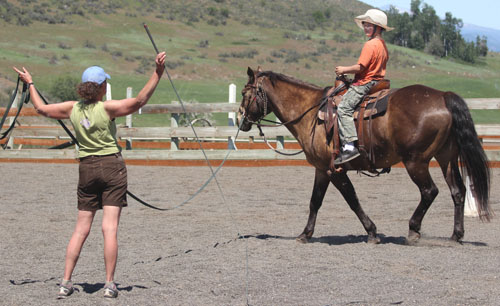 Annie Budiselich gives riding pointers to Methow Valley Elementary School third grader Rian Darwood. Photo by Solveig Torvik Annie Budiselich gives riding pointers to Methow Valley Elementary School third grader Rian Darwood. Photo by Solveig TorvikWith the help of a PSFA grant and volunteers, Budiselich, program director of Methow Valley Riding Unlimited, runs the Let Em Ride program. It’s designed to teach horsemanship “to promote positive self image and interpersonal skills,” according to the organization’s website. For five weeks each spring and fall, 12 elementary school students who may need the boost in self assurance that comes from mastering a non-academic skill are taught to master 1,000-plus pound animals, says special education teacher Laura Schrager. They learn to ride them as well as groom them. "The kids get so much confidence,” says volunteer Bo Thrasher. “I just watch the kids explode with pride.” “I think one of the impacts of this program is that it empowers students and can alter the way they see themselves,” adds volunteer Christine Mullie. PSFA always has funded outdoor education programs, says Lone, as well as provided funds for music and arts courses. Every third grader is offered the chance to learn violin under Pam Hunt’s tutelage, for example, and tuition for violin instruction is provided for 4th graders who need it. “This program has led to the creation of an orchestra at the high school,” says McCreary. 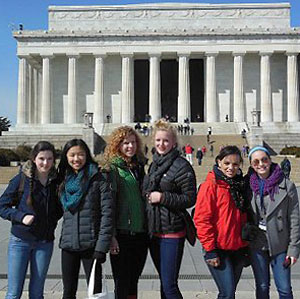 PFSA has funded an annual junior class "close up" trip to Washington, D.C. since 2007. Photo courtesy PSFA PFSA has funded an annual junior class "close up" trip to Washington, D.C. since 2007. Photo courtesy PSFAPSFA has helped with seed money for national programs such as National History Day and Poetry Out Loud. It funds Spanish in kindergarten through 5th grade. It provided funds to hire a college counselor who meets with every senior and also helps pay costs of the annual college campus visits. Some kids are intimidated by the thought of college and may not realize the choices available to them or know how to proceed, says Lone. The list of programs assisted by PSFA is impressive: there’s the Book Fair, the Methow Valley Elementary School’s Young Writers Conference, the 4th and 5th graders science expeditions to the Salish Sea, a tutoring coordinator, Classroom in Bloom and a partnership with Methow Arts that brings visual and performing arts to the schools. Big ticket items at the elementary school this year in the restricted funds category totaled $45,000 and paid for a math instructional coach and a family empowerment counselor. The Science Fair was funded for many years by PSFA, says McCreary. But as has been the case with other programs PSFA initiated with seed money, the district was able to find ways to carry on that program and make it a permanent part of the offerings for students. Some of the organization’s money is raised during Trivia Night, when adult teams challenge student teams on trivia mastery. The rest comes from the annual fund drive, which begins in late summer. 5/21/2013 Comments
|